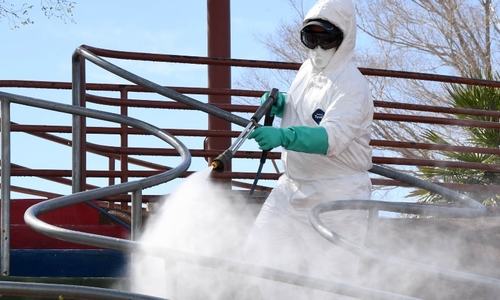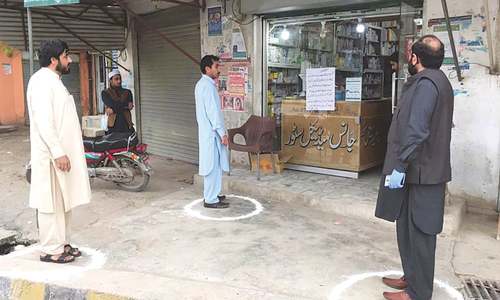ISLAMABAD: The capital administration has opened four ‘ration warehouses’ in the city to provide necessary food to the underprivileged, along with 15 mobile dastarkhawan facilities to distribute cooked meals.
Army and police personnel have also been deployed at city’s entry and exit points after the administration introduced restrictions on the movement of people using public transport.
Deputy Commissioner Mohammad Hamza Shafqaat told Dawn that four ration warehouses have been set up in I-11/4, Tarnol, Taramri and Bhara Kahu. More will be established in other parts of the capital as well.
He said: “Only needy and underprivileged people can get edibles from there free of cost.”
Cooked meals will be provided by mobile langarkhanas, he added. These will be set up at the Pakistan Institute of Medical Sciences, Polyclinic, Aabpara Market, F-11/2, the F-10/2 Service Road, F-10 Markaz, Al-Mustafa Tower in F-10, the F-6 water plant near Kulsoom International, G-10 water plant near Babri Masjid, Khanna Bridge, AlipurFarash, Taramri Chowk and Faizabad.
All markets, malls, restaurants and private offices shall remain closed, public offices will be functional from 10am to 4pm
These facilities are being provided with assistance from the Saylani and Ehsaas programmes, he said, adding that people can also donate edible goods.
The administration has also increased restrictions on the movement of people using public transport, Mr Shafqaat said. Army and police are deployed at all points of entry and exit, including at Faizabad and in Tarnol and Bhara Kahu, in this regard.
A notification issued by the office of the deputy commissioner stated: “There shall be a complete ban on intra-city, inter-district and inter-province movement of people by public transport.”
However, the metro bus service will remain functional from 8am to 10:30am and 3:30pm to 5:30pm. On Fridays, the service will run from 8:30am to 10:10am and 1:30pm to 2:30pm. Passengers must maintain a one-seat distance between them.
The notification said that taxis are allowed to operate, but separate standard operating procedures (SOP) in this regard will be issued.
On Wednesday, the administration took action against violations of the SOP on the functioning of shops, including that no more than seven people can enter shops at a time, and only shops selling edibles may stay open.
Mr Shafqaat said violations were seen at all the large markets, including Aabpara, and 324 shops were closed down.
He said that in light of the violations, shopkeepers have been ordered to submit an undertaking that they will follow the SOPs at the office of the relevant station house officer (SHO).
They will need permission from the SHO to open their shops.
Some stores selling CDs and furniture even opened on the pretext of selling edibles, he said.
They were told to close their business to avoid action for violating SOPs.
According to the notification issued by the deputy commissioner’s office, all markets, malls, restaurants and private offices shall remain closed while public offices will be functional from 10am to 4pm, except on Friday when they will close at 1pm.
All kinds of social or religious gatherings, whether public or private, are banned, and all hospital outpatient departments are suspended, although emergency services will remain functional.
Construction sites may remain functional after taking all the necessary precautions for the safety of workers,which will beinspected by the administration’s industries and labour department.
Besides, those associated with health services, including hospitals, clinics, laboratories, pharmaceutical factories and medical stores, personnel from the law enforcement agencies and essential services are also exempted from restrictions.
The order added that people in need of medical care can be accompanied by two attendants while residents can buy grocery and medicines within the vicinity of their residence.
It further said that necessary religious rites like Namaz-i-Janaza and burial were also exempted from the restrictions.
Public and private telecom and cellular companies, their franchises and customer support centres should ensure minimum possible attendance with no public dealing. Besides, utility companies, relevant directorates and wings of CDA, Iesco, PTCL and SNGPL and essential service of the metropolitan cooperation will remain functional.
Call centres with 50pc staff and no public dealing are allowed while banks can function with only essential staff and specific timing to be notified by the State Bank of Pakistan.
Defence-related manufacturing and packing facility are also allowed.The administration also put conditions on people and establishments given exemption. Preferably one person should travel in a private vehicle, and in case of a medical emergency two attendants may accompany the patient.
Two persons per family may go out to buy essential medicines and grocery while handicapped persons may be assisted by two persons along with a driver.
Persons on vehicles transporting essential food items, medicines, medical equipment from godowns, farms, mills or factories may be assisted by two helpers or cleaners during the transportation, the order stated, adding that all persons travelling must carry CNIC and official card and all personnel of the exempted departments must travel and work keeping in view the policy of social distance.
Published in Dawn, March 26th, 2020















































